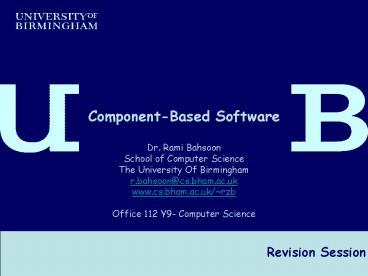Component-Based Software Engineering - PowerPoint PPT Presentation
1 / 24
Title:
Component-Based Software Engineering
Description:
Component-Based Software Dr. Rami Bahsoon School of Computer Science The University Of Birmingham r.bahsoon_at_cs.bham.ac.uk www.cs.bham.ac.uk/~rzb Office 112 Y9 ... – PowerPoint PPT presentation
Number of Views:78
Avg rating:3.0/5.0
Title: Component-Based Software Engineering
1
Component-Based Software Dr. Rami
BahsoonSchool of Computer ScienceThe University
Of Birminghamr.bahsoon_at_cs.bham.ac.ukwww.cs.bham.
ac.uk/rzbOffice 112 Y9- Computer Science
- Revision Session
2
Assessment Exam Structure
- Examination 80
- Group Presentations Group Coursework 20
- Exam Structure 1.5 hrs exam
- Part I Content Questions 32
- Answer FOUR Questions out of SEVEN
- Provide BRIEF AND PRECISE answers
- 8 Each
- Question 1 to Question 7
- Part II Modeling Questions 68
- Three Main Questions
- Question 8 9
- Question 9 26
- Question 10 33
3
Exam Content Part I
- Part I- Questions are mainly derived from
- Unit 1 Essentials to CBS
- Components, characteristics, Interfaces,
Specification, Interface Description Language
(IDL), Components vs. objects, architectures,
Components as services, composition, Component
Models, Frameworks, Middleware - http//www.se-radio.net/podcast/2008-02/episode-87
-software-components - Unit 2 Reflection on the modeling of objects and
components - Unit 3 Engineering CBS Process Lifecycle
- Rational Unified Process
- Model-driven development
- Reuse-driven software development and landscape
- Component-based software lifecycle
4
Part I- Sample Question
- Briefly explain the concept of Model-Driven
Architectures (MDA) and highlight a major
advantage of adopting such a paradigm for
engineering components-based software systems.
8 - Answer?
5
Part I Sample Question - Answer
- A model is a description of a system.
- A PIM describes a system without any knowledge of
the final implementation platform. - A PSM describes a system with full knowledge of
the final implementation platform. - A transformation definition describes how a model
in a source language can be transformed into a
model in a target language. - A transformation tool performs a transformation
for a specific source model according to a
transformation definition. - Advantages?
6
Part II Modeling
- Modeling Objects and Components using UML
- Interpreting UML diagrams
- Modeling
- In the spirit of your Coursework
7
Part II Sample 1
- Interpreting UML diagrams
- In FEW words, explain the relation in the below
diagrams.
8
Answer
Composed of 64 squares
9
Part II Sample 1
- Draft a use case diagram for an online library
system. Make use of both ltltincludegtgt and
ltltextendgtgt stereotypes. State any necessary
assumptions you make. - Answer?
10
Part II Sample 2
- Use UML to model the components and interfaces
corresponding to the given Scenario - Assume that Bob wants to book a holiday
- Bob will book his holiday, where
- He provides the following data His origin
airport, his destination, his dates of
departure/return, and any other preference
information (e.g., budget, luxury, etc) - Bob is interested in promotional offers for the
period of his holiday - He wants to rent a car at his destination.
- He wants to get good hotel deals during his stay.
11
Part II Sample 2
Sketch the components and interfaces
corresponding to the given services
Flight Booking service
Hotel Promotional Service
Car Hire Promotional Service
12
Software Systems Requirements
- After you book a holiday, the company shall
provide the holidaymaker with promotional
services, which include hotel deals and car rent
promotional service at the destination and for
the duration of her/his stay
13
Answer Flight Booking
14
Promotional Hotel Booking Service..
15
You can even provide more services..
16
Car Hire Promotional Service
17
Gluing the Components
18
Part II - Sample 3
- Sketch a sequence diagram for self-service
machine, three objects do the work we're
concerned with - the front the interface the self-service machine
presents to the customer - the money register part of the machine where
moneys are collected - the dispenser which delivers the selected
product to the customer - Derive your collaboration diagram
19
Part II- Sample 4
- Sketch a three-tier architecture for online
banking system - Sketch a client-server architecture for online
inventory system
20
Example of Three-Tiers Architectures
Many of real life web applications have three
tier architectures
21
Deployment Diagrams for Three Tiers
UML 1.4
Components deployed in an architecture
22
Example Client Server Architectures
23
Example Deployment Diagram for a Client Server
Architecture
UML 2.0
24
QA
- Question and Answer Session
- Flipping through the slides?































